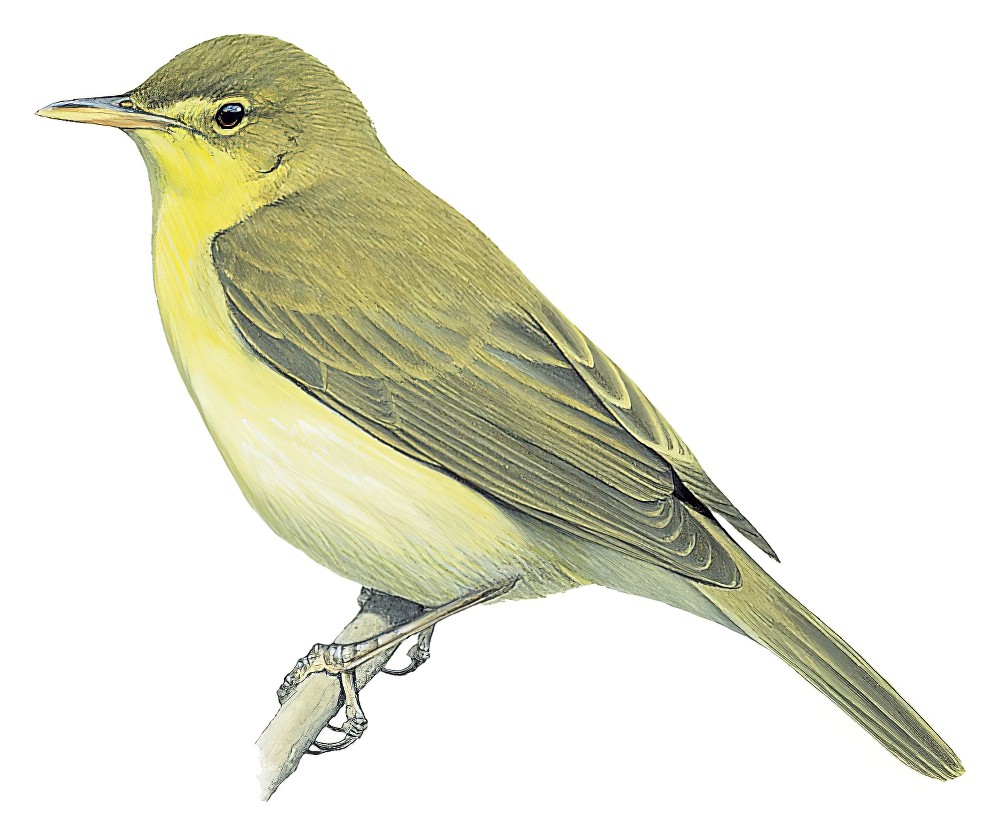Melodious Warbler / Hippolais polyglotta

Melodious Warbler
SCI Name:
Protonym: Sylvia polyglotta Nouv.Dict.Hist.Nat. 11 p.200
Taxonomy: Passeriformes / Acrocephalidae / Hippolais
Taxonomy Code: melwar1
Type Locality: France.
Author: Vieillot
Publish Year: 1817
IUCN Status: Least Concern
DEFINITIONS
HIPPOLAIS
(Acrocephalidae; Ϯ Melodious Warbler H. polyglotta) Specific name Motacilla hippolais Linnaeus, 1766 (= syn. Hippolais icterina); "Der gelbbäuchige Laubsänger. Sylvia hippolais. Lath. ... *) Ich zähle hier die hippolais italica, von welcher ich sogleich reden werde, nicht unter unsre Laubsänger, ehe ich gewiß weiß, ob sie vielleicht auch in der italiänische Schweiz brütet, was ehr warscheinlich ist. ... Der italiänische gelbbäuchige Laubsänger. Hippolais italica. Er ist etwas kleiner, als der Vorhergehende und unterscheidet sich von ihm durch seinen dünklern Oberleib, etwas gelbern Unterleib und gelben Füße. ... Sein Gesang gleicht dem des Vorhergehenden sehr. Töne von der Rauchschwalbe, dem Feldsperling und andern entlehnt, zeichnen sich besonders in demselben aus." (Conrad von Baldenstein 1827); "Hippolais Conrad, 1827, Neue Alpina, 2, p. 77. Type, by monotypy, Hippolais italica Conrad = Sylvia polyglotta Vieillot." (Watson in Peters, 1986, XI, p. 78).
Var. Aypolais, Hyppolais, Hypolais.
Synon. Eleophonus, Ficedula, Horticola, Muscicapoides, Olivetra, Trochilus.
hippolais
Gr. ὑπολαις hupolais small unidentified ground-nesting bird mentioned by Aristotle, Theophrastus and Hesychius, identified by some later authors as the Northern Wheatear Oenanthe. The name may be onomatopoeic, as Jonsson 1992, describes a call of the Icterine Warbler as ‘hippolüeet,’ but cf. BOU 1915: “Hypolais = νπολαις , a bird mentioned by Aristotle ...probably so called from its creeping under stones [ὑπο hupo under; λαας laas stone]. Linnaeus wrote Hippolais by mistake”; ex “Ficedula septima” of Aldrovandus 1599-1603, and “Motacilla virescente-cinerea, subtus flavescens, abdomine albido, artubus fuscis” of Linnaeus 1746. In ornithology lais signifies a warbler (syn. Hippolais icterina).
polyglotta / polyglottos / polyglottus
Gr. πολυγλωττος poluglōttos loud-voiced, harmonious < πολυς polus many; γλωσσα glōssa tongue.
● ex “Todo voz” of de Azara 1802-1805, no. 151 (Cistothorus).
● "95. TURDUS. ... polyglottos. 7. T. obscure cinereus, subtus pallide cinereus, macula alarum albida. Turdus minor cæruleo-albus immaculatus. Sloan. jam. 2. p. 306. t. 256. f. 3. Catesb. car. I. p. 27. t. 27. Raj. av. 185. n. 31. Mocking-bird. Kalm. itin. 2. p. 335. Habitat in Virginia. Eximia voce cantillat & cantu instruitur." (Linnaeus 1758) (Mimus).
UPPERCASE: current genus
Uppercase first letter: generic synonym
● and ● See: generic homonyms
lowercase: species and subspecies
●: early names, variants, mispellings
‡: extinct
†: type species
Gr.: ancient Greek
L.: Latin
<: derived from
syn: synonym of
/: separates historical and modern geographic names
ex: based on
TL: type locality
OD: original diagnosis (genus) or original description (species)












